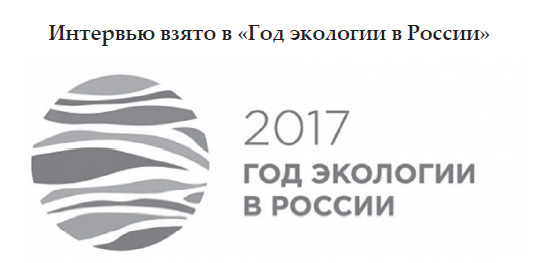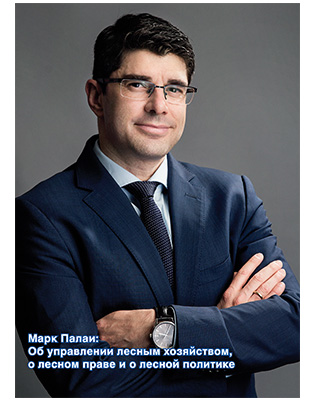№ 6 (109) 2017
Professional Background:
Marc Palahí – director of the European Forest Institute (Joensuu, Finland). Completed his Bachelor’s in Agricultural Sciences and Master’s in Forestry Engineering, University of Lerida & University Polytechnic of Catalonia (Barcelona, Spain). Completed his Master’s degree in Forest Management and Economics, University of Joensuu (Joensuu, Finland). Defended his PhD thesis “Modelling Stand Development and Optimizing the Management of even-aged Scots Pine Forests in North-East Spain”, University of Joensuu (Joensuu, Finland). Author of more than 50 scientific publications. Working languages – Spanish, Catalan, English, French, Russian and Finnish.

— Director Palahí, thank you for taking your time for the interview for the “Eurasian Law Journal”. Could you say a few words about the European Forest Institute (EFI). May be a few words about your work as the EFI’s Director?
– The European Forest Institute (EFI) is a pan-European international organization. Currently, we have 26 Member Countries and 116 member organizations from 36 different countries working in diverse research fields. This dual membership, together with our staff of over 100 experts, is our most important asset. It places EFI in a unique position to generate, connect and share knowledge at the interface between science and policy.
My main task as Director is to develop and share the strategic vision of the Institute in order to address the needs, challenges and opportunities of our Member countries and member organizations. I am also responsible to attract investments to EFI and represent it in different international and national fora.
—  And what are the priority research fields for EFI?
And what are the priority research fields for EFI?
– We are just starting to implement our new strategy and have defined our three strategic themes as bioeconomy, resilience and governance.
Bioeconomy: forests, forestry and the forest-based sector are the cornerstone of the European bioeconomy, and a major contributor to climate change mitigation. The speed and scale of European forest bioeconomy development crucially depends on several questions, such as, technological and market developments within and outside the forest-based sector, the dynamics of global biomass demand and supply, the European and international policy framework and the ability to use forests in a sustainable way. The forest bioeconomy is also affected by globalization, the digital economy and symbiosis with other sectors: construction, chemicals, textiles and energy, etc.
Foresight, interdisciplinary and cross-sectoral research at the interface of markets, products, policies and forest resources is therefore needed. Knowledge about the broad sustainability implications of developing a European forest bioeconomy, as well as the effects of different regulations and policy incentives is also important.
Resilience: the increasing impacts and complexity of global change call for a new strategic role for forests in fostering Europe’s socio-ecological resilience. In a highly urbanised Europe where cities are responsible for 80% of the population and energy use, urban forestry and forest-based solutions like wood construction are key in developing climate-smart cities. The role of forests and trees in enhancing key resources like water, soil and biodiversity need to be better understood in the context of sustainable rural areas and agricultural systems. Furthermore, forest resilience, including a better understanding of the impacts of climate change and the role of forest management on biodiversity conservation needs to be better understood.
The above requires new interdisciplinary research connecting forest science to other land-use disciplines and urban studies as basis for effective integrated policies and forest and land-use management strategies.
Governance: in the future, the dynamics of supply and demand for water, food, energy, raw materials and land will be drastically altered, as result of global change and the need to transition towards a circular, bio-based society. Land will become an increasingly scarce resource and conflicts around land resources may result in global political instability and increasing migration pressure. New transdisciplinary research is needed to support forest governance that is able to align diverging interests and perspectives (e.g., urban versus rural), integrate expectations from different stakeholders and sectors and seek synergies between forest land uses and forest management goals.
Knowledge is needed from local to global and from rural to urban levels, to form a basis for new, science-informed European governance schemes and policies that can reconcile among others resilience and bioeconomy-related goals.
— Does EFI cooperate with Russian organizations, may be some Russian Universities?
– EFI has several member organizations in Russia, in addition we cooperate with business as well as NGOs operating in Russia. EFI, since its establishment, has had very closed cooperation with Russian research based organizations.
– Several years in a row EFI has conducted a “Young Leadership Program on Forest-Based Bioeconomy: Focus on Russia”. Could you please say a few words about the Programme? What are its main objectives, major topics, who is invited to participate in the Programme?
– The Young Leadership Programme provides a unique one-week opportunity for young professionals to interact with their global peers, to better understand the future potential of the Russian forest bioeconomy and its policy, governance and business needs. The Programme provides access to new information and knowledge shared by scientists, policy makers, and business leaders working in the Russian forest sector and its governance. Participants share practical experiences and develop the types of leadership skills that translate knowledge into effective action. Participants are continually challenged to discuss and meet sustainability criteria with collaborative solutions that promote the development of the Russian forest sector.
– In 2012 the United Nations General Assembly proclaimed the 21 of March as the International Day of Forests (IDF). Since then the Day has been celebrating and raising awareness of the importance of all types of forests. Each IDF countries are encouraged to undertake local, national and international efforts to organize activities involving forests and trees, such as tree planting campaigns. The theme for 2017 is “Forests and Energy”. What is your opinion about the initiative? Could you discuss the importance of this particular IDF’s theme selection for this year? And (how) will the EFI support the “IDF”?
– For EFI and for me personally every day is the day of forests. We work continuously to put the forest issues on the political, scientific and media agendas. The topic is important as forest bioenergy helps to respond to an increasing demand for renewable energy sources, meet climate change policy and can also support regional policies in enhancing the rural economy and employment opportunities as an integral part of the forest bioeconomy diverse range of products.
However, it is very difficult to provide a single view on forest biomass-based bioenergy as it can be a thousand different things. The forest biomass source and its management, the end products (heat, power, transport fuel), the conversion technology, the logistics, the environmental impacts, and the markets and opportunities to use bioenergy may vary significantly across regions and countries. In that context, one size fits all policies and approaches are not optimal for enhancing forest biomass-based bioenergy development in a sustainable way. Accurate assessments and specific policies, and better policy coordination with other areas like nature conservation, broader bioeconomy and climate change are needed.
– Some legal scholars consider that the international climate change regime (due to its high political and also financial support) will become a dominant environmental regime in setting the international forest agenda in the coming years. What is your opinion in this regard?
– It is true that climate change will be a major political and economy driver for forest policy and forest management. This is to be expected as forests, forest management and forest-based products are probably the main instruments we have to mitigate climate change and adapt to it. Forests are key global carbon sinks and the main source of non-food and non-feed biological renewable resources, which can be transformed in a new range of bioproducts with high substitution potential of fossil-based products (main cause for climate change). The issue is that addressing climate goals requires more than ever policy and management coordination and integrated approaches that reconcile bioeconomy and biodiversity goals, which are directly affecting climate change mitigation and climate change adaptation, respectively.
– Paris Agreement has become one of the most significant recent events at the international level. What is your opinion on the outcomes of the UNFCCC COP-21? How will this agreement affect forest management in the coming years?
– It is a historic event and sets the political basis for addressing climate change by stimulating the transition towards a low carbon economy. I think that the message sent out from Paris is that such transition is now irreversible. So during the next decades, a new economic paradigm needs to be developed based on circular and biobased principles. In that context, as I already mentioned before, our forests are the main biological infrastructure we have to confront climate change and at the same time support socio-economic prosperity by the production of forest based products.
– How are forests and climate interconnected? Which roles do forests have in mitigating climate change (e.g. in the EU and in the Russian Federation)?
– EU forests have a climate change mitigation effect equivalent to 10% of the EU CO2 emissions. This is equivalent to the emissions of the entire agricultural sector in EU or to the global emissions of plastics production. If the right incentives and policies towards bioeconomy and forest management are put forward, such mitigation effect could be doubled by 2050.
Russia hosts more than 20% of the world forests, and therefore hosts the most important biological infrastructure of the planet. It is clear that Russia will need to develop a new economic model which is not only relying on oil and gas. The existing model makes Russia very dependent on international oil and gas prizes, which are rather volatile. Russia has a great opportunity in building a Bioeconomy based on the intelligent and sustainable use of its forest resources to produce innovative and green products while addressing climate change challenges globally and providing inclusive growth (rural jobs) in its wider territory.
– In your opinion, what are the major EU law and policy developments that affect forestry (e. g. climate law and policy - the Land Use Land Use Change and Forestry (LULUCF) Pillar, the Renewable Energy Directive, etc.)?
– All the policy measures that you mention are relevant and they will have an impact. But what is crucial now is to put forward a cross-policy dialogue and coordination in setting policy targets in order to maximize synergies that make it possible for all policy to achieve their intentions. It is important that new holistic approaches based on seeing the “big picture” are developed to avoid trade-offs, which we cannot afford anymore. For example, bioeconomy and biodiversity are two sides of the same coin, and we will not achieve one without the other. Policies need to recognize that and promote synergetic solutions. Science will play an increasing role in supporting coherent and effective policy frameworks in a very complex world…
– Director Palahí, thank you for sharing with the readers of the «Eurasian Law Journal» your professional opinion on forest management, forest law and policy. We wish You and the European Forest Institute much success for the future work and development.
– I am really thankful for the possibility to contribute to the “Eurasian Law Journal”. Russia can play and should play an important global role in realizing the potential of our forests in addressing the unprecedented global challenges that we are facing in the 21st century: climate change, water security, biodiversity loss, urbanization and rural decline, economic growth and inequality.
Interviewer:



